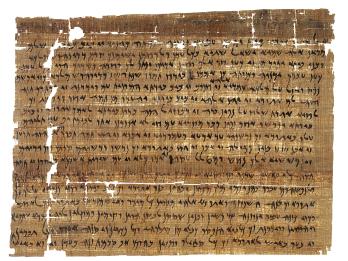Letter about the Travels of Abraham Rovigo
Mordechai de Lattes
1702
Abraham Rovigo (1650–1713) was born in Modena and studied kabbalah under Moses Zacuto in Venice. Rovigo’s wealth enabled him to devote himself to study and to support pious endeavors. Swept up by messianic fervor, he was a follower and major supporter of the Sabbatean movement until his death. He corresponded with many of its important figures, including Nathan of Gaza, and collected information about the leaders and their writings. Despite this, he kept his beliefs strictly secret. Rovigo desired to go to Jerusalem but was delayed for many years. He finally arrived in 1702, together with his family, and founded a yeshiva. Due to his influence and independent means, the rabbis of Jerusalem asked him to act as an emissary. He made at least two trips to Europe to collect funds for Jews in the land of Israel, once in 1704 through 1707 and again in 1710 through 1713. He died in Padua during his final trip. Many of his papers only came to light in the 1920s.
At evening time, there was light, and we saw from afar, with the delight of our eyes, the holy city, may it be rebuilt and repaired speedily and in our days. From that point on, several men and women—young men, elderly people, and wise men—came toward us. All of us successfully entered into Jerusalem, safe and sound, close to five o’clock in the afternoon. However, we were tired and exhausted, especially the women and children, who hardly ate and drank, and upon whom the sun had beaten down. Our virtuous teacher and all of the members of his household entered into the household of the wise man, R. Judah ha-Kohen. Every Friday evening, and Friday during the day, the great rabbis and the heads of the yeshivas and houses of learning would go there and have a reception in his honor. Who would see these figures coming out, and not himself come out? Truly, during that entire day, these figures would consistently come out and go in. He would sit on his bed due to the injury of his foot. Nevertheless, at the time of Kabbalat Shabbat, he was obligated to get up and to go to the Sephardic synagogue; for thus is the custom: the community elders and the administrators of the synagogues would come and bring an offering of perfume and wine—a gift that appropriately honors him—and they would invite him and ask him to go to their synagogue. The heads of the synagogue of the religious school would do the same on the second Sabbath [of the month]. And on the third Sabbath, the Ashkenazic synagogue would do the same. The equal aspect of all of them is that they would be required to contribute large contributions, each one according to its wealth. Thus was the custom of all of the guests. On the holy day of the Sabbath, after going to the synagogue, all of the wise men of Jerusalem would return, and would come to have a reception in his honor, as veritable groups and groups of ministering angels. At the time of the meal, each one would bring a small offering: a glass of wine full of the blessing of the Lord and a silver bowl full of all kinds of sweet delicacies or remarkable fruits, in order to cherish the commandment of welcoming guests.
It is truly a great joy to see how it is that they all cherish and welcome a wise student. However, our joy was not absolute, for on the Monday night of the weekly reading of Tetzaveh, the wife of our honorable teacher and rabbi, the R. Mordechai Ashkenazi, went into labor, and she miscarried a male baby of five months, and she passed away. The whole city was agitated, saying that she had died on account of the plague, for they said that this type of sickness was present. [ . . . ] We sat there and wept. Men and women were veritably running away from the house of our honorable teacher and rabbi, the aforementioned R. Mordechai, as if they were running away from a burning fire. After they were able to find women who came to act charitably toward her body, they testified to the fact that there was absolutely no defect and no clear sign to show that she had died on account of the plague. Then a married Ashkenazic woman went to act charitably toward the aforementioned wise R. Mordechai, by cooking for him and providing for his children. After Purim, she became sick and died after three days. Then, all the more so, people especially thought that the sickness was within his household. Within those days, several other Jews and gentiles were dying. One wise, pious man who had continuously gone to the house of the aforementioned wise R. Mordechai and had eaten and drunk with him also died. Such was the case, that nobody wanted to allow this wise R. Mordechai to enter into his or her house. All the more so, everybody refused to enter into his house. This matter proved to be true through his many transgressions, in that he too became sick. [ . . . ]
Indeed, it seems that after his death the plague had ceased. May there be long and good life! It left the rabbis and everything else. May we merit to sit in the house of the Lord, which is to be the rebuilt Jerusalem, for the length of days, to teach Torah to the multitudes, and to uphold that which is written: For from Zion will come forth Torah, and the word of the Lord from Jerusalem (Isaiah 2:3). Amen, may it thus be His will! [ . . . ]
There [in Jerusalem] they pray the sunrise prayer each and every weekday morning, and during their prayer, they shout and weep and confess with a broken and defeated heart, until they truly break through to the heavens; this is especially so at this time, when the plague is rapidly growing. Perhaps the Lord will look from the heavens and will see, and he will prevent the plague from affecting his people Israel, and from affecting the holy city, and from affecting several pious men who have died on account of their many transgressions. Immediately after the prayer, in holiness and purity, wrapped in their prayer shawls and with tefillin on their heads, they choose to study the book of the Zohar, and after this, the writings of the Ari [R. Isaac Luria], until lunch time. In the afternoon, they study Gemara and the halakhic authorities, and Reshit ḥokhmah, until Minḥah. The beginning of the meeting was on the holy Sabbath day, which was the beginning of the month of Iyar 1702. May it be His will that we may merit to learn and to teach, and to uphold and carry out the commandments in this chosen land. And may He redeem us and save us from all bad sicknesses and various deaths; and may he send us our righteous Messiah, and may He build our holy and beautiful Temple. Amen, may it thus be His will!
Credits
Published in: The Posen Library of Jewish Culture and Civilization, vol. 5.




